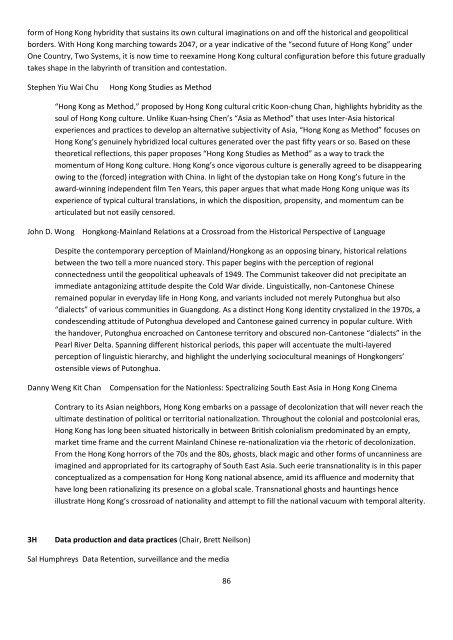Crossroads in Cultural Studies Conference 14-17th December 2016 Program Index
Crossroads-2016-final-draft-program-30-Nov
Crossroads-2016-final-draft-program-30-Nov
Create successful ePaper yourself
Turn your PDF publications into a flip-book with our unique Google optimized e-Paper software.
form of Hong Kong hybridity that susta<strong>in</strong>s its own cultural imag<strong>in</strong>ations on and off the historical and geopolitical<br />
borders. With Hong Kong march<strong>in</strong>g towards 2047, or a year <strong>in</strong>dicative of the “second future of Hong Kong” under<br />
One Country, Two Systems, it is now time to reexam<strong>in</strong>e Hong Kong cultural configuration before this future gradually<br />
takes shape <strong>in</strong> the labyr<strong>in</strong>th of transition and contestation.<br />
Stephen Yiu Wai Chu<br />
Hong Kong <strong>Studies</strong> as Method<br />
“Hong Kong as Method,” proposed by Hong Kong cultural critic Koon-chung Chan, highlights hybridity as the<br />
soul of Hong Kong culture. Unlike Kuan-hs<strong>in</strong>g Chen’s “Asia as Method” that uses Inter-Asia historical<br />
experiences and practices to develop an alternative subjectivity of Asia, “Hong Kong as Method” focuses on<br />
Hong Kong’s genu<strong>in</strong>ely hybridized local cultures generated over the past fifty years or so. Based on these<br />
theoretical reflections, this paper proposes “Hong Kong <strong>Studies</strong> as Method” as a way to track the<br />
momentum of Hong Kong culture. Hong Kong’s once vigorous culture is generally agreed to be disappear<strong>in</strong>g<br />
ow<strong>in</strong>g to the (forced) <strong>in</strong>tegration with Ch<strong>in</strong>a. In light of the dystopian take on Hong Kong’s future <strong>in</strong> the<br />
award-w<strong>in</strong>n<strong>in</strong>g <strong>in</strong>dependent film Ten Years, this paper argues that what made Hong Kong unique was its<br />
experience of typical cultural translations, <strong>in</strong> which the disposition, propensity, and momentum can be<br />
articulated but not easily censored.<br />
John D. Wong<br />
Hongkong-Ma<strong>in</strong>land Relations at a Crossroad from the Historical Perspective of Language<br />
Despite the contemporary perception of Ma<strong>in</strong>land/Hongkong as an oppos<strong>in</strong>g b<strong>in</strong>ary, historical relations<br />
between the two tell a more nuanced story. This paper beg<strong>in</strong>s with the perception of regional<br />
connectedness until the geopolitical upheavals of 1949. The Communist takeover did not precipitate an<br />
immediate antagoniz<strong>in</strong>g attitude despite the Cold War divide. L<strong>in</strong>guistically, non-Cantonese Ch<strong>in</strong>ese<br />
rema<strong>in</strong>ed popular <strong>in</strong> everyday life <strong>in</strong> Hong Kong, and variants <strong>in</strong>cluded not merely Putonghua but also<br />
“dialects” of various communities <strong>in</strong> Guangdong. As a dist<strong>in</strong>ct Hong Kong identity crystalized <strong>in</strong> the 1970s, a<br />
condescend<strong>in</strong>g attitude of Putonghua developed and Cantonese ga<strong>in</strong>ed currency <strong>in</strong> popular culture. With<br />
the handover, Putonghua encroached on Cantonese territory and obscured non-Cantonese “dialects” <strong>in</strong> the<br />
Pearl River Delta. Spann<strong>in</strong>g different historical periods, this paper will accentuate the multi-layered<br />
perception of l<strong>in</strong>guistic hierarchy, and highlight the underly<strong>in</strong>g sociocultural mean<strong>in</strong>gs of Hongkongers’<br />
ostensible views of Putonghua.<br />
Danny Weng Kit Chan<br />
Compensation for the Nationless: Spectraliz<strong>in</strong>g South East Asia <strong>in</strong> Hong Kong C<strong>in</strong>ema<br />
Contrary to its Asian neighbors, Hong Kong embarks on a passage of decolonization that will never reach the<br />
ultimate dest<strong>in</strong>ation of political or territorial nationalization. Throughout the colonial and postcolonial eras,<br />
Hong Kong has long been situated historically <strong>in</strong> between British colonialism predom<strong>in</strong>ated by an empty,<br />
market time frame and the current Ma<strong>in</strong>land Ch<strong>in</strong>ese re-nationalization via the rhetoric of decolonization.<br />
From the Hong Kong horrors of the 70s and the 80s, ghosts, black magic and other forms of uncann<strong>in</strong>ess are<br />
imag<strong>in</strong>ed and appropriated for its cartography of South East Asia. Such eerie transnationality is <strong>in</strong> this paper<br />
conceptualized as a compensation for Hong Kong national absence, amid its affluence and modernity that<br />
have long been rationaliz<strong>in</strong>g its presence on a global scale. Transnational ghosts and haunt<strong>in</strong>gs hence<br />
illustrate Hong Kong’s crossroad of nationality and attempt to fill the national vacuum with temporal alterity.<br />
3H<br />
Data production and data practices (Chair, Brett Neilson)<br />
Sal Humphreys Data Retention, surveillance and the media<br />
86


